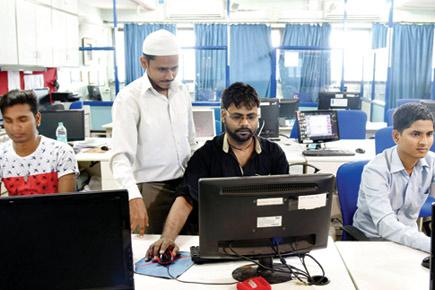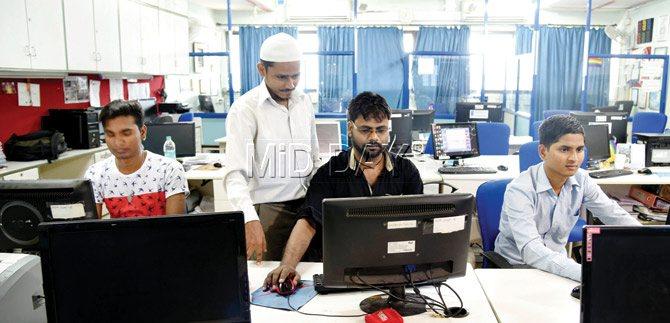Mumbai's transgender community is keen on acquiring spoken English and computer skills; two NGOs have tied up to help them

It’s a bright and sunny Saturday morning and 26-year-old Urmila (name changed) is hurrying to Manthan Plaza in Vakola, Santacruz East, trying not to be late for her class. It’s the one place where she is not judged based on her sexuality or looks, and simply gets to be a student. Computer class starts at 10.30 am and, as always, she’s the first to arrive.
ADVERTISEMENT
 Members from the LGBT community at a computer class at the Humsafar trust office in Vakola, Santacruz East, on Saturday. Pic/Nimesh Dave
Members from the LGBT community at a computer class at the Humsafar trust office in Vakola, Santacruz East, on Saturday. Pic/Nimesh Dave
Urmila is a transgender, one of 10-odd students from the LGBT (Lesbian, Gay, Bisexual and Transgender) community who have now been given the chance to not just return to school to finish their education, but also up their skills in English, tally and computers, among others.
This is part of a joint initiative by VIDYA and the Humsafar Trust, the purpose of which was to allow those, who'd lost on an education on grounds of their sexuality (either due to financial constraints or bullying), a second chance. “Over the years, many people in our community have expressed a keen interest in learning computers as well as spoken English.
We realised that VIDYA is a good platform; they conduct supplementary classes at the grassroots level,” said Pallav Patankar, director, Programs, Humsafar Trust. What started as a sensitisation programme for the management and staff of VIDYA, soon led to the decision of conducting regular coaching for LGBT people.
Jayshree Murali, core management team member at VIDYA, said that the NGO works towards providing supplementary education to children from slums, who are either going to school, or have dropped out and are continuing their education though open schooling.
But, the joint-initiative with Humsafar was not an easy start. “Initially, we got a good response from candidates, most of whom got in touch with us through Humsafar. But, the computer course was a three-month course, five days a week. Soon, the numbers started dropping and eventually, we had to fold up that batch,” said Vaishnavi Vaidyanath, operations manager at VIDYA, talking of the initiative that first began three months ago.
When the team examined what had gone wrong they figured that commuting to classes every day wasn't easy as they had jobs to juggle. “We made changes and now classes are held once a week on Saturdays at the Humsafar Trust office in Vakola,” she added.
At present, about 10-odd students attend these classes regularly and the incentive is that once the session is over, they get to move to spoken English classes. In April 2014, a landmark judgment passed by the Supreme Court made headlines as transgenders were officially termed the third gender.
The judgment further stated that the Center should treat them as economically and socially backward, and hence move away from any form of discrimination. However, very little ground work has been done. Patankar added that in most cases, transgenders don’t want to identify as the third gender as they are worried about fitting into a judgemental society.
“Much sensitisation is still left to be done to ensure that there’s equality at every level. Only then can we encourage people from our community to merge with the rest,” he added.
 Subscribe today by clicking the link and stay updated with the latest news!" Click here!
Subscribe today by clicking the link and stay updated with the latest news!" Click here!






